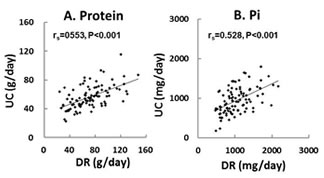Clinical Nutrition and Management

- account_circleHidekazu AraiPhD, RD, Prof.
- account_circleYuka KawakamiPhD, Research Asst. Prof.
- Website:https://dfns.u-shizuoka-ken.ac.jp/labs/nutrcont/
- Mail:arai@u-shizuoka-ken.ac.jp
- Phone:+81-54-264-5511
Searching for nutritional management methods and food compositions that can contribute to the prevention / treatment of disease
Understand the metabolism of sick and healthy people, and explore "true nutritional status"
- 1. Research on evaluating micronutrient intake and validity using 24-hour urine storage methods
To evaluate the latent deficiency of minerals and vitamins in the living body, "biological utilization (metabolism)", we are constructing a method that can grasp the nutritional status using the 24-hour urine storage method. Currently, we carry out clinical research, such as evaluation of nutritional indicators through dietary tests.
- 2. Research on establishment of suitable dietary therapy for hyperuricemia patients
Hyperuricemia is involved in the development of gout attacks and kidney disease and is increasing in young people. However, since the effectiveness of dietary therapy and the identification and mechanism of functional components that promote uric acid excretion have not been elucidated, we are conducting research with the aim of building nutritional evidence for uric acid metabolism.
- 3. Research on establishment of suitable dietary therapy for hyperlipidemia patients
Diet is extremely important in the treatment of dyslipidemia, but the effectiveness of nutritional guidance has not been fully evaluated. Therefore, we are conducting joint research with clinics with the aim of establishing effective nutritional guidance methods based on scientific evidence.
- Figure 1
- Correlation between dietary record and 24-h urine collection. Correlation between dietary record (DR) and 24-h urine collection (UC) for protein (A) and phosphorus (Pi) (B).

- Figure 2
- Change in serum TG levels by counseling for 12 months in the dietary and combined drug treatment groups. Red triangle, dietary counseling alone group (n=47); Blue circle, combined drug treatment group (n=12).

References
- J Nutr Sci Vitaminol 69(1):7-13 (2023)
- J Nutr Sci Vitaminol 69(1):21-27 (2023)
- J Clin Biochem Nutr.72(1):61-67 (2023)
- Clin Rheumatol. 40(7):2881-2888 (2021)
- Nutrition. 85:111128 (2021)
- J Clin Biochem Nutr. 68(1):78-85 (2021)
- Nutrition. 72:110694 (2020)
- J Atheroscler Thromb. 26(1):39-49 (2019)